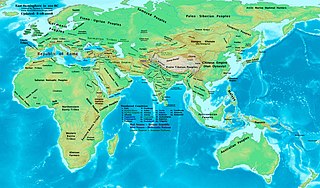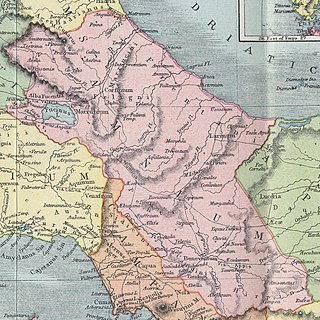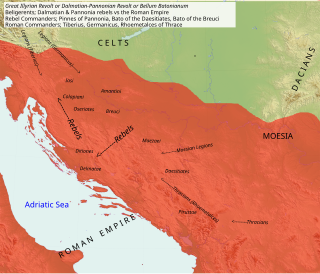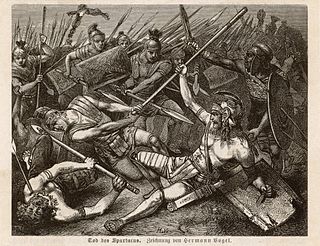Related Research Articles

The 1st century BC, also known as the last century BC, started on the first day of 100 BC and ended on the last day of 1 BC. The AD/BC notation does not use a year zero; however, astronomical year numbering does use a zero, as well as a minus sign, so "2 BC" is equal to "year –1". 1st century AD follows.

The Rebel Alliance is a fictional stateless interstellar coalition of republican dissidents, revolutionary factions and anti-imperialist clandestine cell systems in a resistance movement against the imperialist Galactic Empire. The Alliance's goal is to restore the Galactic Republic. It is the main protagonist faction of the original Star Wars trilogy, parallel to the mostly fallen Jedi Order survived by Obi-Wan Kenobi, Yoda, and later Luke Skywalker.

The Social War, also called the Italian or Marsic War, was waged from 91 to 87 BC between the Roman Republic and other cities and tribes in Italy which had hitherto been allies of Rome for centuries. The Italian allies wanted Roman citizenship, not only for the status and influence that came with it, but also for the right to vote in the Roman Republic. They believed that they should be treated equally to the Romans, given that they had formed cultural and linguistic connections with the Roman civilization, and had been loyal allies for over two centuries. The Romans strongly opposed their demands and refused to grant them citizenship, thus leaving the Italian groups with fewer rights and privileges.

Samnium is a Latin exonym for a region of Southern Italy anciently inhabited by the Samnites. Their own endonyms were Safinim for the country and Safineis for the people. The language of these endonyms and of the population was the Oscan language. However, not all the Samnites spoke Oscan, and not all the Oscan-speakers lived in Samnium.
The Samnites were an ancient Italic people who lived in Samnium in south-central Italy. They became involved in several wars with the Roman Republic until the 1st century BC.
Gnaeus Pompeius Strabo was a Roman general and politician, who served as consul in 89 BC. He is often referred to in English as Pompey Strabo, to distinguish him from his son, the famous Pompey the Great, or from Strabo the geographer.

The Third Servile War, also called by Plutarch the Gladiator War and the War of Spartacus, was the last in a series of slave rebellions against the Roman Republic, known as the Servile Wars. The Third was the only one directly to threaten the Roman heartland of Italy. It was particularly alarming to Rome because its military seemed powerless to suppress it.

Idlib is a city in northwestern Syria, which is the capital of the Idlib Governorate. It has an elevation of nearly 500 meters (1,600 ft) above sea level, and is 59 kilometers (37 mi) southwest of Aleppo. The city was taken over by Syrian rebel militias at the beginning of the Syrian Civil War in 2011, and by 2017 was the seat of the Syrian Salvation Government.
The Battle of the Baetis River was fought between an army of the Roman Republic and a rebel army at the Baetis river in Spain. The battle took place in 80 BC at the start of the Sertorian War. The Romans were led by Lucius Fufidius, while the rebels were led by the Roman rebel Quintus Sertorius. The rebel army was victorious, gaining Sertorius control over Hispania Ulterior.

Caesar's Civil War was one of the last politico-military conflicts in the Roman Republic before the establishment of the Roman Empire. It began as a series of political and military confrontations, between Julius Caesar, his political supporters, and his legions, against the Optimates, the politically conservative and socially traditionalist faction of the Roman Senate, who were supported by Pompey and his legions.

The Bellum Batonianum was a military conflict fought in the Roman province of Illyricum in the 1st century AD, in which an alliance of native peoples of the two regions of Illyricum, Dalmatia and Pannonia, revolted against the Romans. The rebellion began among native peoples who had been recruited as auxiliary troops for the Roman army. They were led by Bato the Daesitiate, a chieftain of the Daesitiatae in the central part of present-day Bosnia, and were later joined by the Breuci, a tribe in Pannonia led by Bato the Breucian. Many other tribes in Illyria also joined the revolt.

Spartacus was a Thracian gladiator who, along with Crixus, Gannicus, Castus, and Oenomaus, was one of the escaped slave leaders in the Third Servile War, a major slave uprising against the Roman Republic. Little is known about him beyond the events of the war, and surviving historical accounts are sometimes contradictory. However, all sources agree that he was a former gladiator and an accomplished military leader.
The Battle of Firmum was fought between a Roman force under Gnaeus Pompey Strabo and a rebel force led by Lafrenius. It took place during the Social War and was a Roman victory.
The Battle of Nola was a battle during the Social War in which the Romans defeated a rebel force under Cluentius. After the battle was won, the Romans chased the rebels to Nola, which kept its gate shut. 23,000 rebels were killed during their flight and before the gates of Nola.

The Battle of Acerrae was fought during the Social War between Roman forces under Lucius Julius Caesar, not to be confused with the triumvir, and rebel forces under Gaius Papius Mutilus.
The Battle of Taenum was fought in 90 BC during the Social War. In the battle, Roman forces under the command of Lucius Julius Caesar were defeated by Italian rebel forces commanded by Marius Egnatius.
The Battle of Aufidius River was a battle during the Social War. Shortly after taking Cannae but losing a subsequent hard-fought battle to the rebels, the Roman commander, Gaius Cosconius, decided to make a stand at the Aufidius River near Cannae. The rebel commander, Trebatius, sent word to Cosconius to let either army cross. Cosconius retreated, letting the rebels cross, but when they were in the process of crossing he attacked them, killing 15,000. Samnite commander Marius Egnatius died during this battle. This victory brought the Romans control of the whole of Apulia and the Iapygian Peninsula which they plundered and burned. At the same time Sulla was campaigning equally successful in the south-west, contrasting the many early defeats of the Roman army during the Social War.
Lucius Junius Brutus Damasippus was a Roman commander during Sulla's civil wars. When Pompey rebelled, Brutus was one of the three commanders sent against him. In an unnamed battle, the first of Pompey’s career, Brutus was defeated. When Sullan forces defeated their opponents, Brutus massacred many neutral senators to prevent them from welcoming Sulla. In the Second battle of Clusium, Brutus and one of the last remaining Marian forces were heavily defeated. The defeated Marian commanders went to the Samnites, with whom they marched on Rome, but were defeated outside its gates by forces led by Sulla and Crassus.
References
- 1 2 3 4 Sampson, Gareth C. (2013-09-09). The collapse of Rome : Marius, Sulla and the first Civil War, 91-70 BC. Barnsley, South Yorkshire. ISBN 9781473826854. OCLC 893910287.
- ↑ "Appian • The Civil Wars — Book I". penelope.uchicago.edu. Retrieved 2019-12-03.
- ↑ Keaveney, Arthur (1983). "Caesars in the Social War". Rheinisches Museum für Philologie. 126 (3/4): 273–281. ISSN 0035-449X. JSTOR 41233487.